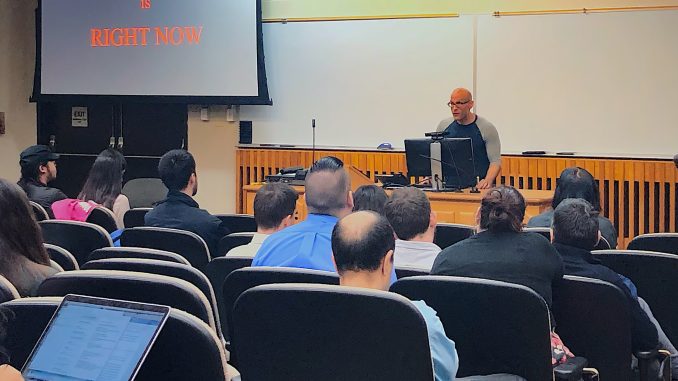
History professor Ralph Young held a teach-in on Friday discussing American anti-Semitism, following the Tree of Life Congregation shooting in Pittsburgh.
The teach-ins, which the history department typically organizes every Friday, hosted Lila Berman, a Jewish studies professor and the director of the Feinstein Center for American Jewish History, and Mark Leuchter, director of the Jewish studies department. More than 200 people gathered for the discussion in Gladfelter Hall.
Young has held teach-ins since 2001 after the September 11 attacks, and originally planned to discuss the immigration crisis on Friday. However, after the synagogue shooting, where 11 congregants were killed by a gunman shouting anti-Semitic slurs on Oct. 27, Berman reached out to Young about switching topics. He moved the teach-in to a larger lecture hall in anticipation of a crowd.
“This teach-in was very unique from many before it, and much of the history discussed really set the right context for how we can interpret the events of past Saturday and move forward and view the current state of America,” said Adam Brock, a junior engineering major, who is not Jewish.
Leuchter spoke first, referencing Loren Jacobs’ appearance at a Michigan rally with Vice President Mike Pence as an example of “supersessionism,” which is the idea that Christians have replaced Jews as “the people of God.”
Jacobs, a former Messianic rabbi, was stripped of his ordination by the Union of Messianic Jewish Congregations in 2003. The Messianic sect of Judaism believes Jesus is the Messiah of Israel and Savior of the world.
“Here’s the issue, when 11 Jews are killed in Pittsburgh, and you have somebody who represents the most marginal of Jewish groups, that 99.999 percent of Jews around the world don’t except as a form Jewish religion, [it makes them upset],” Leuchter said.
“I’m not gonna say that there’s a problem with this man having his beliefs, but what Mike Pence is saying…is that there’s a problem with Jews believing what they believe,” he added. “That’s supersessionism, saying that a Jewish crisis can only be understood through Christian terms.”
Leuchter said people project themselves onto the religion they worship, an explanation for why Jesus appears in Christianity as “the white guy next door” despite being ethnically Middle Eastern.
“When you erase Jesus’ Jewishness, you make Jesus into a European Christian,” Leuchter said.
Leuchter also said Attorney General Jeff Sessions’ description of the shooting as an attack on people of “all religions” was supersessionism and anti-semitic. Leuchter said that the gunman who carried out the Tree of Life synagogue shooting did not care that the victims were people of faith, but that they were Jews.
Next, Berman discussed the idea of “American exceptionalism,” which she said is the belief that America’s institutions, government and democracy, based in Christianity, are what make it an exceptional place. She said being Jewish is separate from what is truly seen as “American.”
“The one phrase, ‘Make America Great Again,’ you can see in it the triumphalist and the exclusionist and the potential for violence that resides in this phrase that in a neat slogan is printable on a red hat,” Berman said. “It’s about pronouncing the ultimate kind of exceptionalism, an aggressive kind of exceptionalism.”
As a collective nation, there has not yet been recognition of the anti-Semitism and white nationalist ideology, which is central in American society, Berman said. If this continues, Berman believes the U.S. will fail to understand how rapidly this form of racism is growing.
Shannon Flaherty, a senior political science major who is not Jewish, attended the teach-in after Leuchter discussed the shooting and how it needed to be politicized while substituting for one of her classes.
“Honestly, I think it was pretty mind-blowing,” Flaherty said. “A lot of the time, when I talk about any type of oppression, it usually comes down to a lot of race-base. In America, I think we get caught up in thinking of race as only black and white, and we forget about all the other races.”
Flaherty said shootings are normalized and the teach-in allowed her to look deeper into current issues that are not just about two sides, but generations of discrimination.
“The fact that many of us have long-recognized that the country we are told we live in is not the one that exists, doesn’t mean we always understand that it does,” Berman said.



Be the first to comment